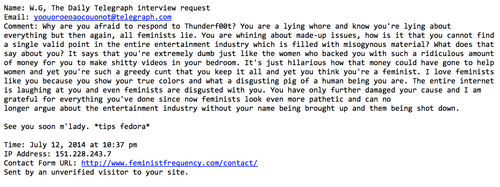
Online platforms like Twitter and Youtube have enabled women to work to curate and create spaces on their own terms. Women have flocked to these services to create their own networks of support, activism, and discussion as well as reclaim online space to talk about shared interests, media fandom, geek culture, video games and more from a feminist perspective. However, as Samantha Allen points out, for all the resources and community the Internet has offered, it has made it...
"...much easier for men to manipulate, harass, abuse, stalk, and, yes, physically harm women.This past weekend, I was on a panel with some members of Nostalgia Chick, a set of veteran media critics who often include feminist perspectives in their videos. They told me that the Internet, in many ways, has become a less hospitable place for them to do their work over the years.
And I believe it. Between 4Chan, Men’s Rights Activist groups, theReddit Red Pill community, pick-up artist (PUA) groups, and anti-PUA groups like the one that Elliot Rodger clung to so dearly, the Internet has allowed men to band together more efficiently than ever before to threaten and antagonize women. Every woman with an online presence has a story to share about unwanted contact, sexual harassment, and predatory behavior."
Anita Sarkeesian, the writer and producer of the Feminist Frequency web video series, started the "Tropes vs. Women In Video Games" series that looks at video game tropes and culture through a feminist lens, has been the target of years of harassment, and recently shared a small sampling of the harassing emails she gets on a regular basis:
I get so many emails like this I could publish a coffee table book full of them.Sadly, this is a widespread problem for women creators on YouTube, and was addressed at this year's VidCon, the world's largest conference for online video content creators. As Rae Votta outlines in "What It's Really Like For Women On Youtube":
It’s especially amusing that this misogyny laced email is unironically signed “See you soon m’lady. *tips fedora*”
In March, abuses of power by men in the YouTube space over their younger, female fans came to light after several women spoke out on Tumblr and other platforms about their experiences, causing community-wide outrage and task forces like YouCoalition, which was formed to “combat sexual abuse, emotional manipulation and other forms of violence in the YouTube community,” according to the website. Saturday’s Women on YouTube panel broached this still-raw topic, emphasizing the opinion that, while the start of the conversation about abuse had a lot of flaws, the important thing is that the community doesn't treat the situation like it’s finished, and still gives the issue the attention that it deserves.Lots of people try to frame harassment and abuse online as "just the Internet", but the emotional toll and physical danger is important, and a very real threat, and carry very real consequences. Recently, Samanta Allen was harassed off Twitter after she was buried under an avalanche of harassing tweets when she talked about how she liked the staff of Giant Bomb but was disappointed that for all the site's talk of valuing diversity, the site's first public hires in years were another two white men. Women's hurt and fear for safety and the emotional toll for being harassed online have real, chilling impact on discourse.
Rojas, who was one of the women who spoke out against inappropriate behavior, chimed in, “We've shown a lot of people that they won’t get away with it.”
“We are not a community that welcomes abusers,” emphasized Lex Croucher. “The most important thing is to encourage people affected by this to come forward and [to be] supportive of those who do come forward.”
This is unacceptable. And the burden of speaking out shouldn't continually fall to the women being harassed. So what can we do? Guys, we have to loudly speak out against this behavior. We have to support women in our creative and media spaces. We need to let other men know that this behavior is not okay, and we need to make it socially unacceptable. We need to listen to women's experiences-- really listen, and not just wait for our chance to say "not all men". We need to realize that online harassment isn't something that just happens-- it's a choice that is made, it is a crime that is done.
As Andy Kouri says in "Fake Geek Guys: A Message to Men About Sexual Harassment":
It is wholly and rightfully and crucially up to men in this society and especially in this subculture to speak out and watch out. To end the cycle of bullying, harassment and violence. To recognize the grotesque irony of degrading women over matters of heroic fictions whose lessons about fairness and decency we’ve supposedly been studying since we were just little boys, and to start putting those ideas into practice as grown-ass men.
Readers, what say you? Sound off in the comments below.


No comments:
Post a Comment